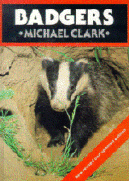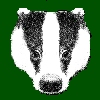Other Natural Causes

Starvation
Other natural causes of death kill many more badgers than
predators. By far the biggest natural killer is simple starvation.
Lack of food is a big problem in dry summers, especially for cubs.
Many badgers die from starvation at this time.
Badgers tend to get nearly all the liquid they need from the
earthworms they eat. If they can not get enough worms or other
"wet" food, they may become de-hydrated. Obviously, in
dry summers providing badgers with suitable wet food won't go
amiss (e.g. clean, fresh water and sloppy cat-food or dog-food).
Winter can also be a time when badgers starve. Usually, badgers
feed well during the autumn, and they build up a lot of body fat.
This helps them to survive during the colder winter months when
there isn't as much food about. However, if a badger eats too
little in
the autumn, it may easily die if the winter is long and very cold.
A badger does not hibernate in the winter. Hibernation is a
state of reduced consciousness and reduced body function; meaning
the hibernating animal has a much slower metabolism; and so needs less
food stored as fat to sustain it through the hibernation. Because
badgers do not hibernate; they still need a good food supply in
winter - if they don't have a good food supply, they use up their
body fat. This is why badgers can look plumper in late autumn and
skinnier in early spring.
Fighting Injuries
Another natural (but indirect) cause of death is due to
fighting each other for dominance within the clan. A badger will
not kill another badger, but persistent fighting and bullying can
push the bullied badger down the pecking order so it gets less
food. If the bullied badger has been injured too and those wounds
become infected, this can accelerate its demise through a
combination of injuries, infection, disease and starvation.
Extinct Threats
Across the UK, adult badgers do not have any natural predators across their
range, as all our our major predators are now extinct. Cubs are slightly more
vulnerable; although the only animals which might be expected to kill cubs are
Golden Eagles and Red Foxes. The consensus view is that cubs may be predated by
chancing upon them rather than because they are specifically targeted. Outside
the UK, large predators may kill adult badgers. Animals such as Wolves, Lynx,
Wolverines, Brown Bear and possibly Eagle Owls may attempt to take cubs if the
opportunity presents itself.
| Michael Clark
book |
 |
This is a superb book about badgers by Michael
Clark. His immense knowledge of badgers really shines through. Click here to buy:
2017 edition or
2010 edition
or
2010 edition
|
|
